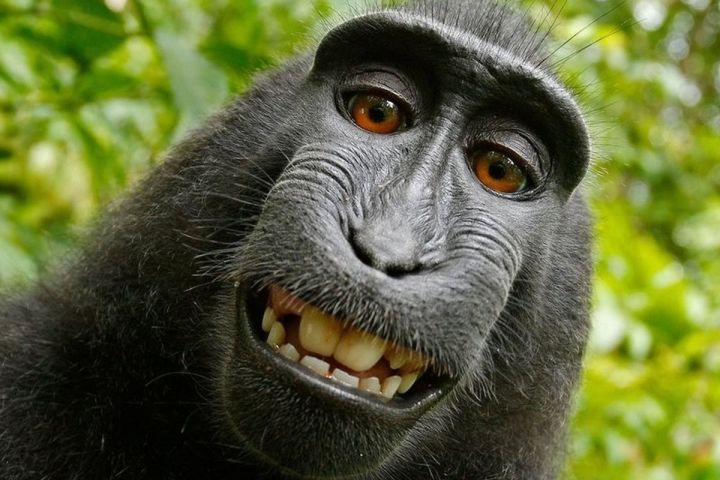
A monkey may be able to snap a selfie — but a monkey cannot sue or own a copyright, an appeals court determined on Tuesday, April 24. People for the Ethical Treatment of Animals (PETA) opened a lawsuit against photographer David Slater in 2015 for publishing a monkey selfie, claiming the crested macaque named Naruto that took the image owned the copyright. A three-judge panel in the Ninth Circuit Court of Appeals denied both parties request for a dismissal for a mutual settlement outside of court and instead delivered a verdict saying that monkeys cannot own copyright — and that PETA now needs to pay the photographer’s attorney fees.
The lawsuit stems from an image shot in 2011 when Slater left his camera unattended in a jungle in Indonesia and a curious monkey decided to take a selfie, complete with a big grin. The photographer self-published a book including the image in 2015 — which PETA says was a violation of the monkey’s copyright. Wikimedia also refused to remove Slater’s photo because as the work of an animal, it wasn’t copyrighted, the website said.
In 2016, a judge ruled that an animal couldn’t own a copyright, but PETA appealed the decision. PETA claimed that nothing inside the copyright law said that the law was just for humans. In today’s decision, however, the judges said that an earlier case, Cetacean v. Bush, said that Congress must explicitly state inside the law that animals can sue. Since there is no animal clause in U.S. copyright law, the judges said that the animal could not own a copyright.
PETA also tried to use “next friend” law in the case, which allows someone to sue on behalf of someone else if that person isn’t available to sue (for example, an individual too young to sue). The court, however, said that PETA didn’t have a significant relationship with the monkey, which is required in next friend lawsuits. After all, Slater and PETA can’t even agree on the monkey’s name — and try tracking down an individual monkey in an Indonesian jungle.
The judges even went as far as accusing PETA of using the monkey as a pawn: “Puzzlingly, while representing to the world that ‘animals are not ours to eat, wear, experiment on, use for entertainment, or abuse in any other way,’… PETA seems to employ Naruto as an unwitting pawn in its ideological goals. Yet this is precisely what is to be avoided by requiring next friends to have a significant relationship with, rather than an institutional interest in, the competent party…” a footnote in the published decision reads.
“I thank the judges for their decision today, that comes at a legal cost of berating a previous precedent about animals having at least some Constitutional rights in the USA,” Slater wrote in a Facebook post. “My case may indeed be a catalyst at overturning a previous but limited animal rights victory that granted animals, at least, some U.S. Constitutional respect … I so hope that wild animals are granted more and more fundamental rights in the future — like rights to dignity, survival, homeland, and their evolutionary privileges. They accept us as part of their landscape, with a big smile.”
Along with dismissing the lawsuit, the judges also approved Slater’s request for attorney fees.



